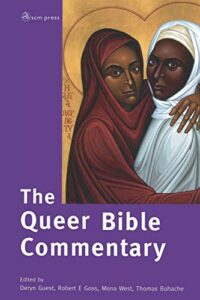1 May 2023
This month, from the evenings of May 25 through May 27, Jewish people around the world will celebrate the holy days of Shavuot, which, according to ancient Jewish tradition, is the anniversary of the revelation at Sinai in 1314 BCE, though academic scholarship does not support this specific date. It is a good time for Jews to turn our attention to how to work with a textual tradition from a very different time and place, and how it can be relevant for today.
Other faiths that rely on a central text also face this same challenge, and within our CLGS multifaith queer community, we can learn from each other. Historically, Scripture has been the province of straight cis men, who then construct social norms and theological ideas from their interpretations. As queer people, we are looking for something different.
 It is really an inspiration to know that for many years now, LGBTQ people have empowered ourselves to “queer the Bible,” that is, to understand and interpret our holy texts though our own experience. Rather than passively accept marginalization, we claim a sacred right to center ourselves and our voices. In this process, we challenge heteronormatively and create space for our own holiness.
It is really an inspiration to know that for many years now, LGBTQ people have empowered ourselves to “queer the Bible,” that is, to understand and interpret our holy texts though our own experience. Rather than passively accept marginalization, we claim a sacred right to center ourselves and our voices. In this process, we challenge heteronormatively and create space for our own holiness.
Through the process of queering, we find the method and ability to value those who have historically been excluded from the mainstream, and we lift up their legacy and insight. As we examine text from the perspective of being queer, we also understand the marginalization of other groups including BIPOC (Black, Indigenous, People of Color), women, disabled people, and many others who are dismissed and discounted by those with power.
An extraordinary resource for this work is The Queer Bible Commentary, first published ten years ago, and now reissued in an expanded second edition. The introduction is by CLGS’s own founding Executive Director Mary Tolbert, and features many essays by CLGS and Pacific School of Religion affiliated scholars and clergy. Recent articles on Queering the Study of Islam also provide opportunities for opening up Qur’an to new interpretations.
A wonderful Jewish volume on this subject is Torah Queeries, commentaries on the Torah using a queer lens. This month, the CLGS Jewish Roundtable will focus its Queeries Series on Queering Shavuot featuring the brilliant LGBTQ pioneer Rabbi Denise Eger. Her presentation is sure to be thought provoking and relevant to all queer people of faith.
Rabbi Jane Rachel Litman | Coordinator of the CLGS Jewish Roundtable


